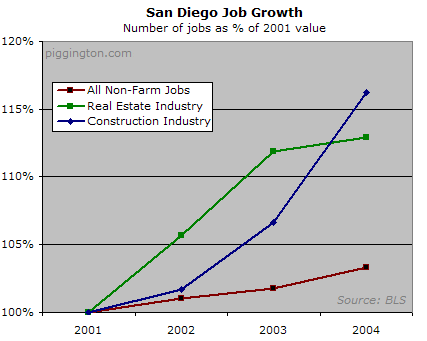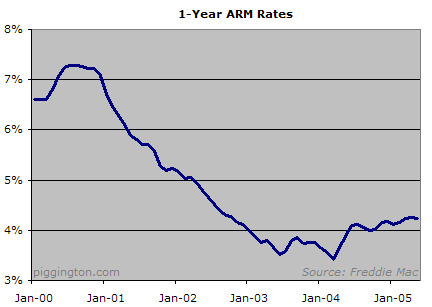The last real estate bust in San Diego was precipitated by a local recession, as thousands of aerospace and defense industry employees lost their jobs and were forced to sell their homes. This fact appears to have engendered an oft-repeated theory that San Diego home prices cannot drop unless we experience a recession. Such a line of reasoning may be comforting, but it is deeply flawed.
Those who claim that a recession is a necessary precondition to a real estate market downturn are disregarding two crucial subjects: the role that housing plays in our local economy, and the role that the credit market plays in keeping home prices aloft.
The Real Estate Economy
One would be hard pressed to overstate the stimulus that the real estate boom has supplied to the San Diego economy. The SD Union-Tribune estimates that 50% of new jobs since 2001 were related to the housing boom, and as the following chart indicates, growth in the construction and real estate industries has significantly outpaced San Diego’s overall job growth during the the same period:

The economic boost provided by all those jobs, while significant, probably pales in comparison to that provided by the “wealth effect” as homeowners have monetized their huge home equity gains through cash-out mortgage refinancings and HELOCs. I can’t quantify that effect exactly*, but to get a flavor, try the following mental exercise:
- Think about all the new and very often expensive cars and SUVs you see on the freeway, in parking lots, and in your own neighborhood.
- Now, think about all those cherry rides while considering the fact that, after adjusting for inflation via the San Diego CPI, San Diego per capita income has fallen every year since 2000.**
San Diego’s economic health has become dependent upon the jobs and influxes of home-equity-derived cash provided by the booming housing market. So it seems rather a circular argument to claim that San Diego housing will do fine as long as the economy holds up!
* After originally writing this article, I did attempt to quantify the wealth effect via this graph from my article on risks of a hard landing.
** Hard to believe, but true… the inflation data came from the BLS and the income data from the BEA.
The House that Borrowing Built
Housing prices are able to stay aloft at these heights largely due to low mortgage rates. And low they are, as indicated by this chart of everyone’s favorite mortgage, the 1-year adjustable:

If rates were to rise to their levels of a mere five years ago, holders (or potential holders) of these mortgages would watch their monthly payments increase by 37%. This would be a negative development for the real estate market, to say the least.
And while rates may be at generational lows, underwriting standards appear to be at their all-time historical lows. If you can fog a mirror, as the now-famous saying goes, you can get a mortgage. And you don’t have to offer proof of income or a down payment, either. It’s well known that San Diegans have taken enormous advantage of the fast and loose lending environment, and with 10% affordability, who would expect otherwise? Should underwriting standards tighten, however, home prices would certainly have to start heading back towards reality.
Will rates rise and lending standards tighten? These are complex questions, and ones that this web site will examine in much more depth over the coming weeks and months. Fortunately, for the purpose of this discussion it’s not necessary to answer them: the point is that, with or without a recession, both rates and lending standards could rise.
It’s a Sharp World Out There
San Diego’s real estate market may appear robust, but it is not. It is utterly dependent on the health of the San Diego economy—which is in turn dependent on further explosive growth in both home prices and sale volumes. It is even more dependent on the indefinite continuance of lifetime-low mortgage rates and underwriting standards. All those dependencies leave a lot that could go wrong.
It’s entirely possible that a future recession will be the undoing of our real estate market, but don’t let anyone tell you that it’s the only possible cause of a housing downturn. A bubble of this proportion could be pricked by many pins.
